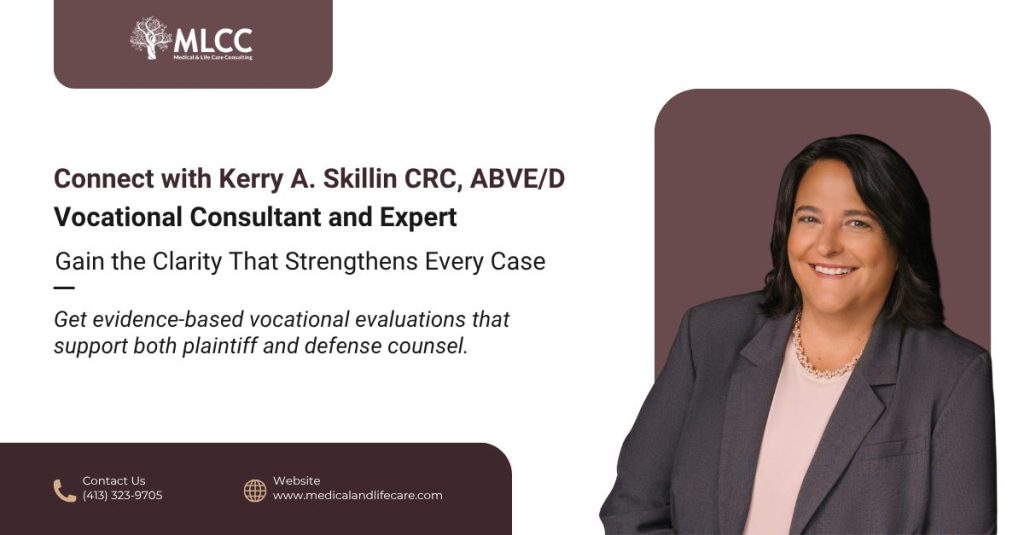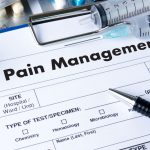When an injury, illness, or disability disrupts someone’s life, the ripple effects go far beyond immediate medical care. Individuals may struggle to return to work, maintain prior income levels, or participate in meaningful vocational activities. For attorneys handling cases in personal injury, medical malpractice, workers’ compensation, employment law, family law, or life care planning, understanding an individual’s vocational potential is critical.
Vocational experts provide the clarity needed to bridge the gap between medical findings and real-world employment outcomes. They assess employability, earning capacity, transferable skills, and job search diligence, providing insights that are vital for litigation, settlement discussions, and future vocational rehabilitation needs.
At Medical & Life Care Consulting (MLCC), we specialize in defensible, evidence-based vocational evaluations for both the plaintiff and defendant bar. With services concentrated in Connecticut and Massachusetts and available nationwide, our vocational consultant delivers actionable insights that guide attorneys, clients, and courts through complex cases.
Understanding the Role of Vocational Experts
Vocational experts assess how an injury or disability affects a person’s ability to work. Their work goes beyond medical diagnoses to consider real-world employment opportunities, labor market conditions, and transferable skills.
Key areas of evaluation include:
- Employability: Determining if the individual is able to work, under what conditions, and in what capacity.
- Earning Capacity: Evaluating potential income in current or alternative jobs, taking into account physical, cognitive,and/or psychological limitations.
- Job Search Diligence: Assessing whether the individual has made reasonable efforts to secure employment post-injury/incident.
Vocational experts also play a crucial role in life care planning. Their assessments help qualify and quantify future vocational rehabilitation needs.. These insights are particularly important in cases involving catastrophic or long-term injuries, where future care and financial planning must be based on accurate vocational information.
Selecting the Right Vocational Expert
Not all vocational experts are created equal. Choosing the right vocational professional can make a significant difference in the strength and credibility of a case. Key considerations include:
- Certification and Education: Look for advanced credentials such as CRC (Certified Rehabilitation Counselor), CVE (Certified Vocational Evaluator), or ABVE/D (American Board of Vocational Experts / Diplomate).
- Litigation Experience: Expertise in state and federal courts ensures familiarity with legal standards, courtroom presentation, and report defensibility.
- Communication Skills: An expert must clearly convey methodology, findings, and recommendations to attorneys, mediators, judges, and juries.
At MLCC, our vocational consultant, Kerry A. Skillin, CRC, CVE, ABVE/D, brings decades of experience evaluating individuals whose lives have been disrupted by injury, illness, or life events. Kerry has provided credible expert testimony in multiple court venues and is known for delivering her vocational opinions on employability, wage earning capacity and job search diligence in a practical, evidence-based, credible and defensible manner.
The Vocational Evaluation Process
A thorough vocational evaluation is multi-dimensional. It integrates medical, vocational, and labor market data to produce a comprehensive and actionable assessment.
1. Comprehensive Records Review
The process begins with an extensive review of medical records, treatment reports, employment records, deposition transcripts, academic records and prior vocational evaluations. This establishes a timeline of injury, functional limitations, and vocational history.
2. Vocational Interview
During the interview, the expert collects detailed information about education, work history, daily routines, hobbies, social involvement, and prior efforts to return to work. The expert will also obtain information relative to the plaintiff’s self-perception of restrictions & limitations and treatment. Observation of demeanor, cognitive function, and physical tolerance, correlated with medical records and testing, also helps determine any work related limitations. When in-person interviews are not feasible, collateral information and records support the vocational opinion.
3. Vocational Testing
Standardized vocational tests provide objective measures of cognitive abilities. Results can be compared to the individual’s vocational history and current self-report of any perceived limitations.
4. Transferable Skills Analysis
Vocational Experts analyze skills gained from prior work, training, education, volunteer activities, and community involvement to identify acquired skills which can transfer to alternative employment opportunities.
5. Labor Market Analysis
Labor market studies evaluate local and regional employment trends, confirm job requirements, identify wages, and job openings. Our vocational expert has a wide breadth of knowledge of the labor market inConnecticut and Massachusetts with decades of experience analyzing the labor market in our backyard. However, our vocational expert has also demonstrated experience analyzing and providing employability evaluations nationwide. The vocational methodology applied is the same no matter the state and our expert is available for testimony nationwide.
Areas of Vocational Service
MLCC’s vocational services apply to a wide range of legal matters. Each area requires a tailored approach that considers employability, earning capacity, vocational rehabilitation potential and job search diligence:
- Personal Injury: Evaluations clarify how an injury affects the ability to work, earn money, and the feasibility of returning to previous employment, alternative work and/or vocational rehabilitation as a mitigation tool. These assessments are critical in settlements and trial preparation. A vocational expert is uniquely qualified to provide an opinion on whether an individual is capable of working and lays the foundation for an economist to assess any potential future lost wages. Without a vocational expert, the economist is left to make unfounded opinions on the individual’s ability to work.
- Employment Law: Vocational analysis supports wrongful termination claims. Vocational Experts can assess whether suitable employment has existed since the termination and if the plaintiff has demonstrated reasonable efforts to secure work.
- Workers’ Compensation: In-person vocational evaluations as usually performed and consist of a vocational interview and administration of vocational testing. The vocational expert will analyze any transferable skills and will conduct a labor market analysis to determine if suitable work exists in the local labor market.
- Family Law: In divorce or custody cases, vocational experts provide objective assessments of earning capacity and employability of one or both spouses. Our vocational expert can render further opinions on whether a party is underemployed and if a reasonable diligent job search has been undertaken.
- Medical Malpractice: When medical negligence causes long-term disability, vocational evaluations quantify employability, earning potential, and potential retraining needs.. These findings directly inform damage calculations and life care plans.
- Long-Term Disability (LTD) / ERISA: Vocational experts evaluate work capacity and market opportunities to support disputes over disability benefits. Assessments consider “Own Occupation” and “Any Occupation” definitions and ensure clarity for complex claims.
Frequently Asked Questions
Q1: What is a vocational expert?
A professional who evaluates an individual’s ability to work and earn income after injury, disability, or life event, providing objective analyses for legal cases and vocational life care planning.
Q2: Where does MLCC provide services?
Our primary focus is Connecticut and Massachusetts, but we also handle cases nationally and internationally. Our vocational expert has handled cases throughout the U.S. over her decades of work.
Q3: How does vocational input support life care planning?
Vocational assessments can address vocational rehabilitation potential, outline a suitable return to work plan and quantify costs.
Q4: What sets MLCC apart?
We combine decades of experience, rigorous methodology, and evidence-based analysis to produce evaluations that are reliable, actionable, credible and defensible in court.







